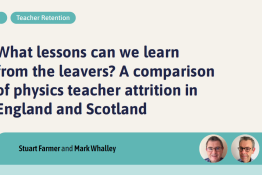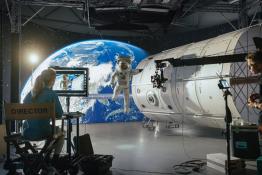Facilitating scientific language proficiency: a modified Frayer Model supporting EAL KS3 learners in secondary science education
Issue 394 | Page 46 | Published Jul 2025
Description
This study investigates the efficacy of a scaffolded modification to the traditional Frayer Model designed to enhance scientific vocabulary acquisition and academic confidence in mixed-ability secondary science classrooms, with a focus on EAL (English as Additional Language) learners. The intervention integrates explicit vocabulary instruction through ‘I say, you say’ routines, MCQs, and contextual gap-fill questions culminating in an independent application task.
Conducted over 18 sessions, 12 with the model and 6 without the model, the study approaches a mixed methods blend of qualitative observations for student engagement with quantitative analysis of classroom disciplinary incidents and a comparative analysis of topic tests. The results demonstrate that the pedagogy significantly enhanced student learners’ capacity to define, use and apply key vocabulary to science answers. But this also built their confidence in the subject as it led to an inclusive and curiosity-driven classroom catering to diverse linguistic needs. ANOVA tests noted a distinct narrowing of the achievement gap between EAL and non-EAL learners. These findings underscore the profound implications of structured, inclusive pedagogy that promotes equitable educational access while enhancing academic success in linguistically diverse science classrooms in London.
References
Alashry, S., Qoura, A. and Gohar, R. (2019) The impact of Frayer Model and contextual redefinition strategy on improving preparatory stage pupils’ vocabulary learning. Journal of Research in Curriculum Instruction and Educational Technology, 4(4), 11–36. https://doi.org/10.21608/jrciet.2019.31954
Aune, K. (2012) Improving vocabulary instruction to increase student comprehension and science literacy. https://api.semanticscholar.org/CorpusID:62440706
Biçer, N. (2023) Evaluation of self-efficacy and job satisfaction of teachers teaching Turkish as a foreign language. SAGE Open, 13(3). https://doi.org/10.1177/21582440231196993
British Educational Research Association [BERA] (2018) Ethical Guidelines for Educational Research. 4th edn. London: BERA.
Campbell, E., Casillas, R. and Bergelson, E. (2024) The role of vision in the acquisition of words: vocabulary development in blind toddlers. Developmental Science, 27(4). https://doi.org/10.1111/desc.13475
Carrier, S. J. (2017) Effective Strategies For Teaching Science Vocabulary. Learnnc.org.
Cassata-Widera, A., Kato-Jones, Y., Duckles, J. M., Conezio, K. and French, L. (2008) Learning the language of science. International Journal of Learning, 15(8), 141–152.
Chin, C. (2007) Teacher questioning in science classrooms: approaches that stimulate productive thinking. Journal of Research in Science Teaching, 44(6), 815–843. https://doi.org/10.1002/tea.20171
Department for Education (2019) Attainment of pupils with English as an additional language. https://assets.publishing.service.gov.uk/media/5f33f94bd3bf7f1b19a40c1c/Attainment_of_EAL_pupils.pdf
Dunlosky, J., Rawson, K. A., Marsh, E. J., Nathan, M. J. and Willingham, D. T. (2013) Improving students’ learning with effective learning techniques. Psychological Science in the Public Interest, 14(1), 4–58. https://doi.org/10.1177/1529100612453266
EEF (2018) Improving Secondary Science: Seven recommendations for improving science in secondary schools. London: Education Endowment Foundation.
Fisher, D., Grant, M. and Frey, N. (2009) Science literacy is > strategies. The Clearing House: A Journal of Educational Strategies, Issues and Ideas, 82(4), 183–186. https://doi.org/10.3200/TCHS.82.4.183-186
Frayer, D. A., Fredrick, W. C. and Klausmeier, H. J. (1969) A schema for testing the level of concept mastery: report from the Project on Situational Variables and Efficiency of Concept Learning. Madison: Wisconsin Research and Development Center for Cognitive Learning.
Gibson, R. (2023) Developing Pupils’ Scientific Vocabulary. Newcastle Research School of Walkergate. https://researchschool.org.uk/newcastle/news/developing-pupils-scientific-vocabulary
Johnson, B. (2014) Educational research: quantitative, qualitative, and mixed approaches. ed. Christensen, L. B. 5th edn. SAGE.
Johnson, R. B. and Onwuegbuzie, A. J. (2004) Mixed Methods Research: A research paradigm whose time has come. Educational Researcher, 33(7), 14–26. https://doi.org/10.3102/0013189X033007014
McComas, W. F. (2014) The Language of Science Education: An Expanded Glossary of Key Terms and Concepts in Science Teaching and Learning. Brill - Sense.
Medina, J. (2008) Brain Rules: 12 Principles for Surviving and Thriving at Work, Home, and School. Pear Press.
Miller, C. D. (2015) The discovery of student experiences using the Frayer model map as a Tier 2 intervention in secondary science. Capella University.
Morin, R. and Goebel, J. (2001) Basic vocabulary instruction: teaching strategies or teaching words? Foreign Language Annals, 34(1), 8–17. https://doi.org/10.1111/j.1944-9720.2001.tb02797.x
Mujtaba, T., Sheldrake, R., Reiss, M. J. and Simon, S. (2018) Students’ science attitudes, beliefs, and context: associations with science and chemistry aspirations. International Journal of Science Education, 40(6), 644–667. https://doi.org/10.1080/09500693.2018.1433896
Murty, V. P. and Dickerson, K. C. (2016) Motivational influences on memory. Advances in Motivation and Achievement, 19, 203–227. https://doi.org/10.1108/S0749-742320160000019019
Nemati, A. (2009) Memory vocabulary learning strategies and long-term retention . International Journal of Vocational and Technical Education, 1(2), 014–024.
Office for National Statistics (2023) International migration and the education sector – what does the current evidence show?
Panjaitan, N. B. and Sihotang, H. M. (2020) A comparative study between Frayer Model and concept mapping strategy to enhance students’ vocabulary acquisition. Acuity: Journal of English Language Pedagogy, Literature and Culture, 5(1), 39–66. https://doi.org/10.35974/acuity.v5i1.2221
Redifer, J. L., Bae, C. L. and DeBusk-Lane, M. (2019) Implicit theories, working memory, and cognitive load: impacts on creative thinking. SAGE Open, 9(1), 215824401983591. https://doi.org/10.1177/2158244019835919
Reiss, M. (2018) Beyond 2020: ten questions for science education. School Science Review, 100(370), 47–52.
Reiss, M. J. and White, J. (2013) An Aims-Based Curriculum. London: Institute of Education Press.
Rupley, W. H. and Slough, S. (2010) Building prior knowledge and vocabulary in science in the intermediate grades: creating hooks for learning. Literacy Research and Instruction, 49(2), 99–112. https://doi.org/10.1080/19388070902780472
Ryan, R. M. and Deci, E. L. (2017) Self-Determination Theory. Guilford Publications.
Sapsford, R. and Jupp, V. (2006) Data Collection and Analysis. SAGE. https://doi.org/10.4135/9781849208802
Shirazi, S. (2017) Student experience of school science. International Journal of Science Education, 39(14), 1891–1912. https://doi.org/10.1080/09500693.2017.1356943
Tan, M. (2011) Mathematics and science teachers’ beliefs and practices regarding the teaching of language in content learning. Language Teaching Research, 15(3), 325–342. https://doi.org/10.1177/1362168811401153
Towell, J. (1997) Fun with vocabulary. The Reading Teacher, 51(4), 356–358. http://www.jstor.org/stable/20201928
Tracy, S. (2018) The Frayer Model: Teaching Vocabulary in the Science Content area for Middle School Life Science. Montana State University. https://scholarworks.montana.edu/xmlui/handle/1/14812
Westby, C. (2024) Frayer Model for vocabulary development. Word of Mouth, 35(3), 13–14. https://doi.org/10.1177/10483950231211841d
Williams, J. (2023) Scientific language: how important should it be to teachers of science? School Science Review (In Depth), 105(389), 32–36.
Williams, J. (2024) Scientific language in the classroom. School Science Review (In Practice), 105(390), 16–17.
More from this issue
TIMSS is a large-scale four-yearly international assessment of mathematics and science performance, attitudes and reported experiences. TIMSS...
This article draws on the studies into why physics teachers in England and Scotland had left teaching (Farmer and Whalley, 2025; Whalley, 2024)...
Michael Hal Sosabowski suggests critically analysing science in films to encourage healthy scepticism.
References
...




